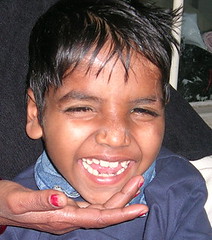
My mother died of cancer. Many do. The difference was that she stubbornly refused all form of treatment. She bore her excruciating pain with rare courage. Life had to be lived till the very last breath was her leitmotiv, and she did, remarkably alive as she quietly died.
She could have had the best treatment and at least the most sophisticated pain killers, but somehow she refused them all. For many years after her death I battled with ifs and buts and ceaseless torment. My demons were only set to rest when I met a leading oncologist who shared his view about terminal diseases with me.
Dr de Souza had been with Bombay's leading cancer institute for many years and has held a unique discourse to many patients and their families who come remote parts of India. Strangely enough he has ofter sent them back, counselling them not to spent their meagre resources or sell their last possessions for a treatment that will never cure the disease. One must remember that the poor only come to such specialised institutes when the disease is too far gone. His advise is to take care of the living and their future rather than fight a lost battle. Instead of hospitals he set up hospices so that the terminally ill could be cared for, and the family find some support.
All this came back from some recess of my brain as I made sense of our poor little Nanhe's mom was trying to convey. She had just been told that both Nanhe's kidneys had packed up and that his only chance of survival was a kidney transplant. I wish he had just taken the Dr de Souza way and sent her home with the right advise, no matter how harsh and cruel it sounded as what awaited her was even worse.
The doctors who gave her this unreachable ray of hope knew Nanhe's condition and what awaited him. They were aware of the fact that even if he got a kidney he would never walk, never comprehend the world and never be able to survive. One is not even thinking of the innumerable obstacles that exist on the way to an organ donation. To rid themselves of the constant nagging of a loving mother, they just told her to buy a kidney at the cost of Rs 100000. Maybe they thought she would be scared away by the astronomical figure, but they forgot they were dealing with a mother.
But we know we are.
But how does one tell a mother that there is nothing much that can be done for little Nanhe. How do we tell her that her son is slowly getting ready to move on to another and hopefully better world. How do we explain to her that what the doctors have said were empty words, and that for this one time ever a mother's prayer will not be heard.
We have had many a difficult moments, bu this is one that defies them all as where does one find the words to say that Nanhe's smile is today in real danger?
